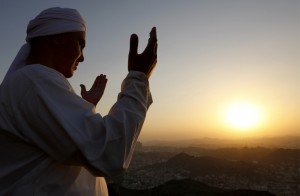Originally posted 2024-01-22 22:37:02.

The important aspect of a believer’s faith is his or her relationship with God.
Islam signifies the submission of all aspects of life to the Law of Almighty God, leaving no room for personal whims or desires. God has commanded the believers to declare:
“Truly, my prayer, my sacrifice, my life, and my death are [all] for Allah, the Lord of the Worlds.” (Al-An`am 6:162)
This declaration means that a Muslim is someone who has submitted their entire being and life to God. The foremost duty of a Muslim is to live in obedience to God alone.
The verse also refutes the notion that life can be divided into isolated compartments — one religious and the other secular. It is incorrect to claim, “This part of my life belongs to religion, and this other part lies outside God’s jurisdiction.”
The two fundamental sources of Islam — the Qur’an and the Sunnah — teach that once God is acknowledged as the Creator, Sustainer, and Lawgiver, there is no room to follow “other gods,” whether they be ideologies, desires, or cultural constructs.
Islam is a comprehensive way of life. It calls upon its followers to shape their entire existence according to the principles revealed in the Qur’an and exemplified in the Sunnah. Far from being unrealistic, this simply requires a shift in outlook and priorities.
Naturally, such a transformation will impact both one’s internal and external life. But for those who seek a meaningful and upright life, Islam offers the path.
Meaningful Worship
Importantly, Islam does not impose rituals for their own sake, as empty rituals often devolve into mechanical actions devoid of meaning. God says in the Qur’an:
“Righteousness is not turning your faces toward the east or the west, but [true] righteousness is in one who believes in Allah, the Last Day, the Angels, the Book, and the Prophets; and gives wealth, in spite of love for it, to relatives, orphans, the needy, the traveler, those who ask [for help], and for freeing slaves; and who establishes prayer and gives zakah; [those who] fulfill their promises when they promise; and [those who] are patient in poverty, hardship, and during battle. Those are the ones who have been true, and it is they who are the righteous.” (Al-Baqarah 2:177)
Thus, rituals in Islam are only valuable if they influence daily life. Conversely, everyday actions — if done with sincerity and the intention of pleasing God — also become acts of worship.
The Prophet Muhammad (peace and blessings be upon him) once told his Companions that even satisfying one’s desires lawfully could be a source of reward. They were surprised and asked, “How can we be rewarded for something we enjoy?” The Prophet replied:
“If one satisfies this desire unlawfully, would they not be punished? Likewise, by fulfilling it lawfully, they are rewarded.” (Muslim)
This holistic approach to worship encourages believers to spiritualize all aspects of life. However, this does not diminish the value of ritual worship. When performed with understanding and sincerity, rituals endow the worshiper with moral strength and spiritual clarity that positively influence all areas of life.
In Islam, the Arabic term for worship — `ibadah — encompasses far more than the “pillars of Islam” such as prayer, fasting, charity, or pilgrimage. It includes everything a believer believes, says, or does with the intention of pleasing God. All such actions, whether ritualistic or otherwise, are considered acts of worship.
Prayer: The Heart of Worship
Among all acts of ritual worship, prayer (salah) holds a special place. It is unique to Islam and fundamentally distinct from prayer in other religious traditions.
The physical act of prostration in prayer symbolizes complete submission to God. While certain supplications are recited during prayer following the teachings of the Prophet Muhammad (peace be upon him), the objective of the prayer itself is not material. Muslims can make personal supplications in any language at any time, but the formal salah must follow the prescribed words and forms taught by the Prophet.
Muslims believe that prayer was ordained for all prophets and their followers. For instance, God said to Moses:
“Indeed, I am Allah. There is no deity except Me, so worship Me and establish prayer for My remembrance.” (Ta-Ha 20:14)
Prayer is a direct manifestation of a believer’s relationship with God. Performed with sincerity and concentration, it elevates the soul, fills the heart with love for God, and inspires hope for Paradise.
Praying five times daily enables Muslims to remain in constant remembrance of God and provides a frequent opportunity for repentance. The Prophet said:
“Imagine a stream running in front of a person’s house, and he bathes in it five times a day. Would he have any dirt left on him?” The people replied, “None at all.” The Prophet said, “That is the example of the five daily prayers: through them, Allah wipes away sins.” (Al-Bukhari)
Prayer nourishes the believer’s God-consciousness and helps guard against sin. God says:
“Establish prayer. Indeed, prayer restrains from shameful and evil deeds, and the remembrance of Allah is greater. And Allah knows what you do.” (Al-`Ankabut 29:45)
Prayer builds spiritual resilience, enabling the believer to withstand temptation and remain patient during life’s challenges. God says:
“Indeed, mankind was created anxious — when evil touches him, impatient; and when good touches him, withholding — except for those devoted to prayer. Those who are constant in their prayer…” (Al-Ma`arij 70:19–23)
Conclusion
Prayer is the living core of Islamic worship. It is both a duty and a spiritual lifeline. When performed with sincerity, it transforms the believer — shaping character, guiding behavior, and strengthening the bond with the Creator. Through prayer, Islam helps individuals lead lives rooted in faith, discipline, and a deep awareness of God in all things
____________________
Taken with slight modifications from Onislam.net.
 Arabic
Arabic English
English

